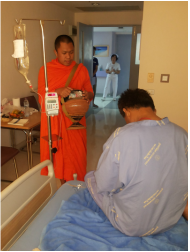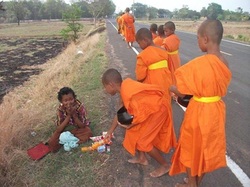 Making merit is one of the most common practices of Thai Buddhists. It is also one of the least understood by outsiders (by whom I mean those not deeply oriented to Thai culture). It is not uncontroversial among Buddhist scholars, either. For those of us who are immersed in Thai village life, merit-making is both universal and sometimes overlaps other venerations. Making a contribution of food to Buddhist priests is probably the most common tradition of merit making in Thailand. This is called “tak bahtr” or “binta bahtr” which is literally to dip or ladle rice into a monk’s alms bowl. Therefore the term refers to giving offerings to priests by placing them into the bowls either carried by the priests or arranged for that purpose on a table. A bahtr is a round wide-mouth bowl or pot made of clay, bronze or iron without ornamentation. I have transliterated the word with a final R (which is not pronounced) because that is the way the word is spelled, and it is not same spelling as the Thai money or weight of precious metal called a baht. The monk’s bahtr has a lid that was traditionally used as a plate. In some communities monks still sally forth early in the morning, walking barefoot, with their bahtr in a sling over their shoulder to collect food for themselves and other monks in the temple. This is not begging, but an act of compassion on the part of the monks. By going out to the people they make it easier for busy folks to earn merit and to express their devotion to Buddhism. Here in our village the custom is for village units to take turns taking food to the temple for our two monks, who are not young anymore. On special occasions almost everyone in the village goes to the temple with food to tak bahtr. It is understood that the tradition is older than Buddhism. Before the Buddha, the people made offerings of food to ascetics and Brahmans. That was how those mendicants were fed. As the Buddha was starving himself in a desperate attempt to excel at asceticism in order to achieve his break-through to enlightenment, a young woman brought him a plate of rice. He realized that extreme asceticism would not work, so he accepted the rice and re-directed himself down a middle-pathway of sufficiency. Every incidence of tak bahtr commemorates that middle path and affirms it. In this spirit a monk came to the hospital the other day when we were there as Pramote, my spouse, was a patient. The opportunity to tak bahtr was not to be missed. Pramote, all hooked up to his IV drip, put his contribution into the bahtr and then received a blessing. He was hopeful it offset at least part of the bad deeds or consequences that had put him in the hospital.
0 Comments
 Good will is a two-way road. These little Thai novices know the flow. Schools are closed here for the hot season. A percentage of young boys will spend a month as novices. One of their opportunities after being ordained is to make the morning rounds, which gives people the chance to make merit by providing them with gifts of food and snacks. Inevitably, the process is that the merit-makers present their offerings and the fellows in saffron robes chant a blessing. The blessings go both directions. As the fellows are initiated into their month in the temple one of the most poignant moments is when the boys, recently shorn of the hair on their heads and eyebrows, are reminded by a village elder of how much they owe to their mothers for her nurture…literally for her mother’s milk. Then the merit they make from entering the temple is transferred to their mother. Of course, the merit is infinite and so they also accrue merit as well as important lessons during their month. But in the morning they take off their shoes and sling their brass bowl over their shoulder and walk solemnly through the roadways where a couple of days ago they were riding their bicycles recklessly and carefree. Everyone in Thailand knows this scenario by heart. Why half a million people said they “like” this Facebook posting may take a word or two for the rest of us. What the picture captures is a very unusual role reversal and expression of good will (nam jai). Beside the road was a woman who, by appearances, is a street wanderer without visible means of support. A few of the guys emptied out their bowls for her. The boys will surely learn important lessons they will never forget this month, but some of them already know one of the Lord Buddha’s basic precepts about good will and compassion. |
AuthorRev. Dr. Kenneth Dobson posts his weekly reflections on this blog. Archives
March 2024
Categories |
| Ken Dobson's Queer Ruminations from Thailand |
|
 RSS Feed
RSS Feed
